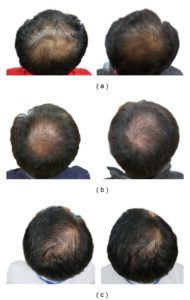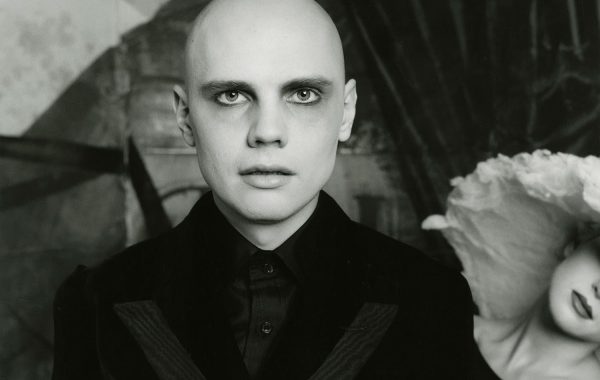Last Updated on June 8, 2020 by Robert Price
Remember the Smashing Pumpkins?
They were a popular 90s rock band with a bald singer named Billy Corgan, pictured above. Will pumpkin seed oil SMASH your hair loss problem?
Or will you just end up as bald as Billy if you try it instead of a proven treatment? Not that there’s anything wrong with being bald, of course.
And the short answer is no, to both questions. If you’re destined to go bald, pumpkin seed oil alone probably isn’t going to save your hair, though it may help to some degree.
Here’s the deal. Most natural hair loss treatments are scams. Do an Amazon search for baldness cures and you’ll find a small ocean of snake oils. Pumpkin Seed Oil is a little different. It stands out in the marketplace as one of the more promising, natural remedies for hair loss.
Is it a miracle cure for balding? Not even close.
In this article, I’ll review the studies and research on pumpkin seed oil, which appear to suggest that it may be a mildly effective solution for hair loss. I’ll also provide you with general use instructions, cite opinions from top doctors and other experts, review the top-rated pumpkin seed oil products, and more. Let’s begin.

If you already look the professor, no hair loss treatment will help you, sorry. But here’s the 101, introductory section for the rest of you.
Pumpkin Seed Oil for Hair Loss – The Basics
What is Pumpkin Seed Oil?
Rich and nutrient dense, PSO (pumpkin seed oil) is made from raw pumpkin seeds; it is available in capsule and raw oil forms. PSO has been known for its healing properties since the 17th century, when it was first produced in Austria.
How Does It Work?
The mechanism that allows PSO to treat hair loss is unknown. But researchers believe that phytosterols, steroid compounds similar to cholesterol, play a role (1).
These compounds are known to inhibit 5-alpha reductase, an enzyme that prompts the conversion of testosterone to DHT. As you may know, DHT is the hormone that is the primary cause of pattern hair loss. So, it appears that pumpkin seed oil may work by reducing 5-alpha reductase and DHT levels in the body, similarly to finasteride, AKA propecia.
Other Uses
Pumpkin seed oil is also reportedly beneficial for prostate health, immune support (via zinc), treating some menopausal and diabetic symptoms, heart and liver health, and more (2). Dr. OZ is a fan, and he cites PSO as one of his best-kept health secrets.
Pumpkin Seed Oil Study
The most significant and comprehensive study on pumpkin seed oil as a hair loss treatment was a Korean study done in 2014. It had 74 participants; 90 were recruited but 16 were excluded because of high liver enzyme levels. All of the patients had mild to moderate cases of androgenic alopecia (male pattern baldness).
The Treatments
Half the patients were given a placebo. The other half were treated with 400 milligrams of pumpkin seed oil capsules daily. They took two 100 mg capsules before breakfast, followed by two more before dinner.
Evaluation Methods
Phototrichography, a polarizing technology, was utilized. The most severe site of baldness was analyzed in all the patients at baseline. The center of the photography system was placed at that site for all subsequent evaluations. Hair counts were also performed, using two different lenses. Patients rated their own hair regrowth as well.
Results
After 6 months, researchers concluded that 44% of the group taking the pumpkin seed oil had a slight or moderate improvement in hair growth. 51% saw no significant changes, positive or negative. One patient (2.7%) saw his hair loss symptoms worsen slightly.
As you might expect, the placebo group didn’t fare nearly as well. 28% had more hair loss at the conclusion of the study. 64% were unchanged. And somehow, 7.7% of the subjects saw a slight or moderate improvement in their hair loss symptoms.
Hair counts were also much higher in the PSO-treated group. About 3 times higher, in fact. The phototrichographic analysis showed that, overall, the patients treated with PSO saw a 30-40% increase in hair counts, compared to a 5-10% increase in the placebo group. Patient satisfaction ratings was also considerably higher in the PSO intervention group, compared to those who were given the placebo.
Before and After Photos (Click to Enlarge)

Copyright © 2014 Young Hye Cho etc all. Photos of three patients from the study. Click to view the original.
Pumpkin Seed Oil Side Effects
The PSO was well-tolerated in the study. One subject in the intervention group complained of a whole-body itching sensation, as did one subject in the placebo group. So that was a wash. And, one patient in the PSO-treated group did complain of some mild abdominal discomfort.
The Verdict
The researchers concluded that pumpkin seed oil could improve male pattern hair loss; they also said it should be considered as a natural alternative to finasteride (Propecia), while noting that additional studies were needed (3).
Why haven’t there been more PSO studies?
Two reasons.
- It’s extremely expensive and time-consuming to conduct empirical, blinded, medical studies.
- This is my opinion: I’m not sure the financial incentive is there. Getting funding to review natural hair loss treatments could be a challenge for researchers.
Potential Problems with This Study
Where to start. Lots of issues, for sure.
The before-and-after, photo results seemed a little suspect to me — perhaps a bit too good to be true? Those three subjects saw pretty remarkable improvements.
Also, this is another big one: the participants were NOT given pure pumpkin seed oil supplements. Instead, they were given a supplement called Octa Sabal Plus, which contains pumpkin seed oil, along with a variety of other ingredients.
Those ingredients include mixed vegetable, red clover, and tomato powders, as well as corn silk and evening primrose powder. Now, evening primrose powder is also regarded as an effective natural hair growth remedy. It’s not one of the most popular options, but people have reported success with it.
This begs the question: Did the participants in this study have success as result of the pumpkin seed oil alone, the evening primrose power, or did all the ingredients play a role? I can’t say for certain. But PSO was the only ingredient listed in the study’s title — so I imagine the researchers believe that’s the active ingredient.
Finally, the PSO dosages administered in the study are another area of concern. Patients were only given 400 mg per day. 500 to 1,000 mg is the most common, recommend dosage range I’ve seen. Some people have even reported taking 2,000 mg per day, particularly in the early phases of treatment.
Pumpkin Seed Oil Vs. Propecia
Pumpkin seed oil and finasteride are two of the most popular, internal hair loss treatments. Finasteride is generally regarded as the best, most effective option on the market, by far. But many people are hesitant to take it, primarily due to the small risk of long-term sexual side effects.
That’s where natural alternatives come in, like pumpkin seed oil and Saw Palmetto, which is sometimes regarded as Nature’s Propecia. No studies have compared finasteride and pumpkin seed oil that I’m aware of.
However, in a two-year study, finasteride was compared with Saw Palmetto for the treatment of male pattern baldness. It is believed that both saw palmetto and PSO may work similarly, by lowering DHT levels in the body.
There were 100 participants in the study. 38% of patients in the Saw Palmetto group saw an increase in hair growth, whereas 68% of those treated with finasteride noted an improvement (4). So, the saw palmetto group saw some marked regrowth over the 2-year period, but the finasteride group ultimately had much better results.
Compliance can be an issue with finasteride, though. A 3-year, UCLA survey of 1261 men is often cited. It found that of those 1,261 respondents, only 414 men (or about 33%) stuck with the medication long-term. 297 men (or about 24%) discontinued the drug after between 3 and 15 months, citing poor results. The remaining 549 men were lost to follow-up (5).
Supplementary Treatments
You want to treat hair loss both internally and externally, if possible. Pumpkin seed oil appears to be a potent, natural, internal treatment option, even though it’s long-term effectiveness has yet to be established.
But PSO probably won’t work on its own. That’s why combining PSO with a topical hair loss treatment such as minoxidil may be your best course of action. If you prefer sticking with natural solutions, rosemary oil is a popular, all-natural alternative to minoxidil. Laser therapy, PRP, and saw palmetto could also be worth considering, but check with your doctor first. You shouldn’t use Propecia or finasteride with pumpkin seed oil, unless you have permission for your physician.
Pumpkin Seed Oil FAQs
What are the side effects and counter-indications of pumpkin seed oil?
I couldn’t find any credible articles that listed the side effects or contraindications of pumpkin seed oil. It’s generally well-tolerated based on everything I’ve read so far. But if you’re pregnant, nursing, or you’re having surgery in the near future, you shouldn’t even consider taking PSO without talking to your doctor first. And you should discuss any new supplements you’re considering with your doctor, regardless.
Should I take the oil or capsules?
Patients took PSO capsules in the aforementioned study. Dr. Josh Axe, a prominent naturalist, suggests taking 1 tablespoon daily as a hair loss supplement (6). Ultimately the choice is yours.
How long will it take to work?
It sounds like many patients start seeing results at around the 6-month mark, perhaps a bit sooner. No improvements were noted at three months in the 2014 study.
What dosage should I take?
Dosage recommendations seem to vary widely. In the Korean study, patients took just 400 milligrams of pumpkin seed oil — 200 mg, twice daily. Most of the top products seem to be in the 500-1,000 mg range.
What the Experts Say
It’s unlikely that many hair loss specialists or dermatologists recommend PSO to their patients. I looked, I couldn’t find any. Hair loss specialists want to prescribe proven hair regrowth solutions, like finasteride and minoxidl. There’s no evidence, at this point, to suggest that PSO is an effective, long-term hair loss remedy. Long-term is the key word there.
But the early research is promising. Even Dr. William Rassman of BaldingBlog, who is generally very skeptical of natural and non-FDA approved hair loss treatments, was encouraged by the 2014 PSO study (7).
Also, it should be noted that many hair loss specialists do prescribe Saw Palmetto to their patients. The ISHRS, or International Society of Hair Restoration Surgeons, found in a 2015 member survey that 18.7% of the respondents either always, often, or sometimes prescribed saw palmetto (8). And PSO appears to have at least as much potential as Saw Palmetto.
There have been a few more studies on Saw Palmetto as a hair loss treatment. It’s been a known commodity for longer. My guess is that’s the main reason that doctors recommend it more frequently than they recommend PSO.
Naturalists, on the other hand, love pumpkin seed oil! Dr. Josh Axe lists it as one of 6 secrets to reversing hair loss, along with omega-3 fatty acids, adaptogenic herbs, b-complex vitamins, zinc, and the aforementioned saw palmetto.
Top Pumpkin Seed Oil Products
Note – be cautious when choosing a supplement. The industry is very unregulated. The quality and potency of supplements can vary widely among brands. Stick with trusted, reputable brands and you shouldn’t have any major issues.
- Now Foods Pumpkin Seed Oil – Now Foods has been around since the 60s and it has a very good reputation by and large. This appears to be the most popular pumpkin seed oil product on Amazon at the moment.
- Swanson Pumpkin Seed Oil – Another well-known, premium, supplement brand. Good reviews, looks like a quality product.
- La Tourangelle Toasted Pumpkin Seed Oil – One of the top-rated, regular oils available. Tastes great over salads, pasta, bread, and more. Excellent substitute to butter. Many people also just take a tablespoon or two per day for their hair health.
Pumpkin Seed Oil for Hair Loss – Conclusion
If you’re scared of Propecia, pumpkin seed oil could be a viable and reasonably effective alternative. It can help treat your hair loss from within, like Saw Palmetto, another popular and similar treatment option. How long will it work? The jury’s still out. But the early research is promising. It’s not going to be a miracle cure, and it may do nothing for you — so have realistic expectations. With all that said, pumpkin seed oil could very well be a worthwhile addition to your hair loss treatment program.
Robert Price is a writer, consumer advocate, and hair loss researcher with thousands of hours of experience in the field. His goal is to keep you out of the hair loss rabbit hole, underworld, or whatever you want to call it. He founded Hair Loss Daily, the unbiased hair loss blog, in 2016. You can learn more about Robert in the my story section of this website.


